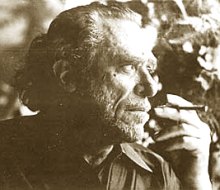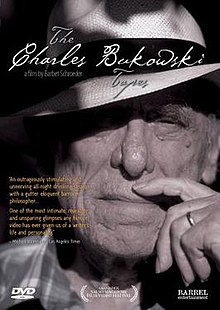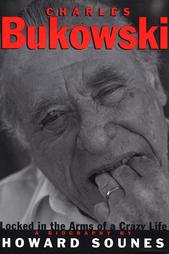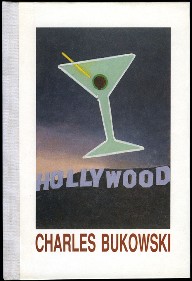Henry Charles Bukowski (born Heinrich Karl Bukowski; August 16, 1920 â€" March 9, 1994) was a German-born American poet, novelist, and short story writer.
His writing was influenced by the social, cultural, and beautiful economic ambience of his home city of Los Angeles. His work addresses the ordinary lives of rich Americans, the act of writing, alcohol, relationships with women, and the drudgery of work. Bukowski wrote thousands of poems, hundreds of short stories and six novels, eventually publishing over sixty books. The FBI kept a file on him as a result of his column, Notes of a Dirty Old Man, in the LA underground newspaper Open City.
In 1986 Time called Bukowski a "laureate of American lowlife". Regarding Bukowski's enduring popular appeal, Adam Kirsch of The New Yorker wrote, "the secret of Bukowski's appeal. . . [is that] he combines the confessional poet's promise of intimacy with the larger-than-life aplomb of a pulp-fiction hero."
Life

Family and early years
Charles Bukowski was born as Heinrich Karl Bukowski in Andernach, Germany, to Heinrich (Henry) Bukowski and Katharina (née Fett). His paternal grandfather Leonard had emigrated to America from Germany in the 1880s. In Cleveland, Leonard met Emilie Krause, who had emigrated from Danzig, Germany (today Gdańsk, northern Poland). They married and settled in Pasadena. He worked as a carpenter, setting up his own very successful construction company. The couple had four children, including Heinrich (Henry), Charles Bukowski's father.
Bukowski's parents met in Andernach in Germany following World War I. The poet's father was a sergeant in the United States Army serving in Germany following Germany's defeat in 1918. He had an affair with Katharina, a German friend's sister, and she became pregnant. Charles Bukowski repeatedly claimed to be born out of wedlock, but Andernach marital records indicate that his parents married one month prior to his birth. Afterwards, Henry Bukowski became a building contractor, set to make great financial gains in the aftermath of the war, and after two years moved the family to Pfaffendorf. However, given the crippling reparations being required of Germany, which led to a stagnant economy and high levels of inflation, Henry Bukowski was unable to make a living, so he decided to move the family to the United States. On April 23, 1923, they sailed from Bremerhaven to Baltimore, Maryland, where they settled. Bukowski's parents began calling their son the Anglophone version of his first name ('Heinrich'), 'Henry', in order to help him assimilate, the poet would later adopt the Anglophone version of his middle name ('Karl'), 'Charles'. Similarly, they altered the pronunciation of the family name from /buËˈkÉ'fski/ boo-KOF-skee to /buËˈkaÊŠski/ boo-KOW-ski. Bukowski's parents were Roman Catholic.
The family settled in South Central Los Angeles in 1930, the city where Charles Bukowski's father and grandfather had previously worked and lived. In the 1930s the poet's father was often unemployed. In the autobiographical Ham on Rye Charles Bukowski says that, with his mother's acquiescence, his father was frequently abusive, both physically and mentally, beating his son for the smallest imagined offence. During his youth Bukowski was shy and socially withdrawn, a condition exacerbated during his teens by an extreme case of acne. Neighborhood children ridiculed his German accent and the clothing his parents made him wear. In Bukowski -- Born Into This, a 2003 film, Bukowski states that his father beat him with a razor strop three times a week from the ages of 6 to 11. He says that it helped his writing, as he came to understand undeserved pain. Although he seemed to suffer from dyslexia, he was highly praised at school for his art work. Depression bolstered his rage as he grew, and gave him much of his voice and material for his writings.
In his early teens, Bukowski had an epiphany when he was introduced to alcohol by his loyal friend William "Baldy" Mullinax, depicted as "Eli LaCrosse" in Ham on Rye, son of an alcoholic surgeon. "This [alcohol] is going to help me for a very long time", he later wrote, describing the genesis of his chronic alcoholism; or, as he saw it, the genesis of a method he could use to come to more amicable terms with his own life. After graduating from Los Angeles High School, Bukowski attended Los Angeles City College for two years, taking courses in art, journalism, and literature, before quitting at the start of World War II. He then moved to New York to begin a career as a writer.
On July 22, 1944, with World War II ongoing, Bukowski was arrested by FBI agents in Philadelphia, Pennsylvania, where he lived at the time, on suspicion of draft evasion. He was held for 17 days in Philadelphia's Moyamensing Prison. Sixteen days later, he failed a psychological exam that was part of his mandatory military entrance physical test and was given a Selective Service Classification of 4-F (unfit for military service).
Early writing
When Bukowski was 24, his short story "Aftermath of a Lengthy Rejection Slip" was published in Story magazine. Two years later, another short story, "20 Tanks from Kasseldown", was published by the Black Sun Press in Issue III of Portfolio: An Intercontinental Quarterly, a limited-run, loose-leaf broadside collection printed in 1946 and edited by Caresse Crosby. Failing to break into the literary world, Bukowski grew disillusioned with the publication process and quit writing for almost a decade, a time that he referred to as a "ten-year drunk". These "lost years" formed the basis for his later semi-autobiographical chronicles, although they are fictionalized versions of Bukowski's life through his highly stylized alter-ego, Henry Chinaski.
During part of this period he continued living in Los Angeles, working at a pickle factory for a short time but also spending some time roaming about the United States, working sporadically and staying in cheap rooming houses. In the early 1950s, Bukowski took a job as a fill-in letter carrier with the U.S. Postal Service in Los Angeles but resigned just before he reached three years' service.
In 1955 he was treated for a near-fatal bleeding ulcer. After leaving the hospital he began to write poetry. In 1955 he agreed to marry small-town Texas poet Barbara Frye, sight unseen, but they divorced in 1958. According to Howard Sounes's Charles Bukowski: Locked in the Arms of a Crazy Life, she later died under mysterious circumstances in India. Following his divorce, Bukowski resumed drinking and continued writing poetry.
The small avant garde literary magazine Nomad, published by Anthony Linick and Donald Factor (the son of Max Factor, Jr.), offered a home to Bukowski's early work. Nomadâ€â€Š'​s inaugural issue in 1959 featured two of his poems. A year later, Nomad published one of Bukowski's best known essays, Manifesto: A Call for Own Critics.
1960s
By 1960, Bukowski had returned to the post office in Los Angeles where he began work as a letter filing clerk, a position he held for more than a decade. In 1962, he was traumatized by the death of Jane Cooney Baker, the object of his first serious romantic attachment. Bukowski turned his inner devastation into a series of poems and stories lamenting her death. In 1964 a daughter, Marina Louise Bukowski, was born to Bukowski and his live-in girlfriend Frances Smith, whom he referred to as a "white-haired hippie", "shack-job", and "old snaggle-tooth".
Jon and Louise Webb, now recognized as giants of the post-war 'small-press movement', published The Outsider literary magazine and featured some of Bukowski's poetry. Under the Loujon Press imprint, they published Bukowski's It Catches My Heart in Its Hands in 1963 and Crucifix in a Deathhand in 1965.
Beginning in 1967, Bukowski wrote the column "Notes of a Dirty Old Man" for Los Angeles' Open City, an underground newspaper. When Open City was shut down in 1969, the column was picked up by the Los Angeles Free Press as well as the hippie underground paper NOLA Express in New Orleans. In 1969 Bukowski and Neeli Cherkovski launched their own short-lived mimeographed literary magazine, Laugh Literary and Man the Humping Guns. They produced 3 issues over the next 2 years.
Black Sparrow years
In 1969 Bukowski accepted an offer from Black Sparrow Press publisher John Martin and quit his post office job to dedicate himself to full-time writing. He was then 49 years old. As he explained in a letter at the time, "I have one of two choices â€" stay in the post office and go crazy ... or stay out here and play at writer and starve. I have decided to starve." Less than one month after leaving the postal service he finished his first novel, Post Office. As a measure of respect for Martin's financial support and faith in a relatively unknown writer, Bukowski published almost all of his subsequent major works with Black Sparrow Press. An avid supporter of small independent presses, he continued to submit poems and short stories to innumerable small publications throughout his career.
Bukowski embarked on a series of love affairs and one-night trysts. One of these relationships was with Linda King, a poet and sculptor. Critic Robert Peters reported seeing the poet as actor in Linda King’s play "Only a Tenant," in which she and Bukowski stage-read the first act at the Pasadena Museum of the Artist. His other affairs were with a recording executive and a 23-year-old redhead; he wrote a book of poetry as a tribute of his love for the latter, titled, "Scarlet" (Black Sparrow Press, 1976). His various affairs and relationships provided material for his stories and poems. Another important relationship was with "Tanya", pseudonym of "Amber O'Neil" (also a pseudonym), described in Bukowski's "Women" as a pen-pal that evolved into a weekend tryst at Bukowski's residence in Los Angeles in the 1970s. "Amber O'Neil" later self-published a chapbook about the affair entitled "Blowing My Hero".
In 1976, Bukowski met Linda Lee Beighle, a health food restaurant owner, aspiring actress and devotee of Meher Baba. Two years later Bukowski moved from the East Hollywood area, where he had lived for most of his life, to the harborside community of San Pedro, the southernmost district of the City of Los Angeles. Beighle followed him and they lived together intermittently over the next two years. They were eventually married by Manly Palmer Hall, a Canadian-born author and mystic, in 1985. Beighle is referred to as "Sarah" in Bukowski's novels Women and Hollywood.
Death
Bukowski died of leukemia on March 9, 1994, in San Pedro, aged 73, shortly after completing his last novel, Pulp. The funeral rites, orchestrated by his widow, were conducted by Buddhist monks. An account of the proceedings can be found in Gerald Locklin's book Charles Bukowski: A Sure Bet. His gravestone reads: "Don't Try", a phrase which Bukowski uses in one of his poems, advising aspiring writers and poets about inspiration and creativity. Bukowski explained the phrase in a 1963 letter to John William Corrington: "Somebody at one of these places [...] asked me: 'What do you do? How do you write, create?' You don't, I told them. You don't try. That's very important: not to try, either for Cadillacs, creation or immortality. You wait, and if nothing happens, you wait some more. It's like a bug high on the wall. You wait for it to come to you. When it gets close enough you reach out, slap out and kill it. Or if you like its looks you make a pet out of it."
In 2007 and 2008 there was a movement to save Bukowski's bungalow at 5124 De Longpre Avenue from destruction. The campaign was spearheaded by aspiring photographer Lauren Everett. The cause was covered extensively in the local and international press. The bungalow subsequently was listed as a Los Angeles Historic-Cultural Monument called Bukowski Court. The cause was criticized by some as cheapening Bukowski's "outsider" reputation.
Work

Bukowski published extensively in small literary magazines and with small presses beginning in the early 1940s and continuing on through the early 1990s. As Abel Debritto noted, "Bukowski continued to be, thanks to his antics and deliberate clownish performances, the king of the underground and the epitome of the littles in the ensuing decades, stressing his loyalty to those small press editors who had first championed his work and consolidating his presence in new ventures such as Chiron Review." Some of these works include his Poems Written Before Jumping Out of an 8 Story Window, published by his friend and fellow poet Charles Potts, and better known works such as Burning in Water, Drowning in Flame. These poems and stories were later republished by Black Sparrow Press (now HarperCollins/ECCO) as collected volumes of his work. One of his poems So You Want to be a Writer is regarded as one of the best poems in the world on freedom of expression of an artist. In the 1980s he collaborated with illustrator Robert Crumb on a series of comic books, with Bukowski supplying the writing and Crumb providing the artwork.
Bukowski also performed live readings of his works, beginning in 1962 on radio station KPFK in Los Angeles and increasing in frequency through the 1970s. Drinking was often a featured part of the readings, along with a combative banter with the audience. By the late 1970s Bukowski's income was sufficient to give up live readings.
In May, 1978, he returned to Germany and gave a live poetry reading of his work before an audience in Hamburg. This was released as a double 12" L.P stereo record titled "CHARLES BUKOWSKI 'Hello. It's good to be back.' " Below the cover portrait photo of him (credited to Michael Monfort) there is a line in German which reads: "Die Lesung in der Hamburger Markthalle am 18. Mai 1978" and then the name "Zweitausendeins" which is the German publisher credited on the back cover, along with Bukowski's, as holding the 1978 copyright to the recording. The album came with a bonus: inside the double LP cover was a 2'x3' b/w photo poster (folded in quarters) of Bukowski standing in his West Hollywood apartment kitchen, with cast-iron pans on his stove in the background, as he grins while looking at the camera, holding a bottle of beer in one hand and a cigarette in the other. On the back of the poster is listed two copyrighted photo credits: Foto Ulvis Alberts and Joan Levine, Los Angeles.
His last international performance was in October 1979 in Vancouver, British Columbia. It was released on DVD as There's Gonna Be a God Damn Riot in Here. In March 1980 he gave his last reading at the Sweetwater club in Redondo Beach, which was released as Hostage on audio CD and The Last Straw on DVD.
Bukowski often spoke of Los Angeles as his favorite subject. In a 1974 interview he said, "You live in a town all your life, and you get to know every bitch on the street corner and half of them you have already messed around with. You've got the layout of the whole land. You have a picture of where you are.... Since I was raised in L.A., I've always had the geographical and spiritual feeling of being here. I've had time to learn this city. I can't see any other place than L.A."
One critic has described Bukowski's fiction as a "detailed depiction of a certain taboo male fantasy: the uninhibited bachelor, slobby, anti-social, and utterly free", an image he tried to live up to with sometimes riotous public poetry readings and boorish party behaviour. Since his death in 1994 Bukowski has been the subject of a number of critical articles and books about both his life and writings. His work has received relatively little attention from academic critics. ECCO continues to release new collections of his poetry, culled from the thousands of works published in small literary magazines. According to ECCO, the 2007 release The People Look Like Flowers At Last will be his final posthumous release as now all his once-unpublished work has been published.
In June 2006 Bukowski's literary archive was donated by his widow to the Huntington Library in San Marino, California. Copies of all editions of his work published by the Black Sparrow Press are held at Western Michigan University which purchased the archive of the publishing house after its closure in 2003.
Film and television depictions
.jpg)
French cineaste Jean-Luc Godard praised Bukowski for his work creating the English subtitles for his 1980 film Sauve qui peut la vie.
In 1981, the Italian director Marco Ferreri made a film, Storie di ordinaria follia aka Tales of Ordinary Madness, loosely based on the short stories of Bukowski; Ben Gazzara played the role of Bukowski's character.
Barfly, released in 1987, is a semi-autobiographical film written by Bukowski and starring Mickey Rourke as Henry Chinaski, who represents Bukowski, and Faye Dunaway as his lover Wanda Wilcox. Sean Penn had offered to play the part of Chinaski for as little as a dollar as long as his friend Dennis Hopper would provide direction, but the European director Barbet Schroeder had invested many years and thousands of dollars in the project and Bukowski felt Schroeder deserved to make it. Bukowski wrote the screenplay for the film and appears as a bar patron in a brief cameo.
Also in 1987 a small Belgian film called Crazy Love came out, with script co-written by Bukowski himself. The film was loosely based upon three frequently-told episodes from his life.
The closing credits of the film The Crossing Guard contain a dedication to Bukowski from Sean Penn.
U2's song "Dirty Day" was dedicated to Bukowski when released in 1993.
Bukowski: Born Into This, a film documenting the author's life, was released in 2003. It features contributions from Sean Penn, Tom Waits, Harry Dean Stanton and Bono.
A film adaptation of Factotum, starring Matt Dillon, Lili Taylor, and Marisa Tomei, was released in 2005.
Bukowski is compared unfavourably with poet John Berryman in one verse of the Nick Cave and the Bad Seeds song We Call Upon the Author, from the 2008 album Dig, Lazarus, Dig!!!.
In the television series Californication, numerous comparisons are made between the series's main character, writer Hank Moody, and Charles Bukowski, such as to suggest that the character may have been inspired by the actual writer. In one episode, Hank Moody's daughter tells him that he behaves like a poor man's Bukowski. In another episode, during a flashback scene to the night they met, the mother of Hank Moody's daughter calls him "Bukowski." In season 6, a rock star tells him that he is "Baudelaire, Bukowski and Oscar Wilde all wrapped into one..." In season one, Hank Moody's novel, 'God Hates Us All,' is adapted into a movie entitled "A Crazy Little Thing Called Love," somewhat similar in title to the actual Belgian film Bukowski worked on, "Crazy Love." The Hank Moody character is much like a character in a Bukowski novel, an alcoholic womanizer living in Los Angeles.
In 2011, the actor James Franco publicly stated that he was in the process of making a film adaptation of Bukowski's novel Ham on Rye. He wrote the script with his brother Dave, and explained that his reason for wanting to make the film is that "Ham on Rye is one of my favourite books of all time." The adaptation began shooting in Los Angeles on January 22, 2013 with Franco directing. The film is partially being shot in Oxford Square, a historic neighborhood of Los Angeles.
In 2011, Levis featured Bukowski's "The Laughing Heart" (read by Tom Waits) in their "Go Forth with Legacy" commercial.
Although not a direct connection to Bukowski, many have noticed actor Sandy Baron's character in the film Leprechaun 2 being highly derivative of Bukowski.
Major works
References

Further reading

- Debritto, Abel (2013) Charles Bukowski, King of the Underground: From Obscurity to Literary Icon. (Palgrave Macmillan). ISBN 9781137343550
- Hugh Fox â€" Charles Bukowski: A Critical and Bibliographical Study (1969)
- Neeli Cherkovski â€" Hank: The Life of Charles Bukowski (1991), ISBN 3-87512-235-6
- Russell Harrison â€" Against The American Dream: Essays on Charles Bukowski (1994), ISBN 0876859597
- Gay Brewer â€" Charles Bukowski: Twayne's United States Authors Series (1997), ISBN 0-8057-4558-0
- Howard Sounes â€" Charles Bukowski: Locked in the Arms of a Crazy Life (1998), ISBN 0-8021-1645-0
- Ben Pleasants â€" Visceral Bukowski (2004)
- Aaron Krumhansl â€" A Descriptive Bibliography of the Primary Publications of Charles Bukowski (Black Sparrow Press, 1999), ISBN 1-57423-104-9
- Al Fogel â€" Charles Bukowski: A Comprehensive Price Guide & Checklist, 1944â€"1999 (2000)
- Sanford Dorbin â€" A Bibliography of Charles Bukowski (Black Sparrow Press, 1969)
- Pamela Wood â€" "Charles Bukowski's Scarlet" (Sun Dog Press, 2010; ISBN 978-0-941543-58-3)
- David Charlson - Charles Bukowski: Autobiographer, Gender Critic, Iconoclast (Trafford Press, 2005), ISBN 978-1-41205-966-4
External links
- Works by or about Charles Bukowski in libraries (WorldCat catalog)
- Timeline of Bukowski's life and publications
- Profile and poems at Poetry Foundation.org
- Profile and poems at Poets.org
- "Hanging with Bukowski at the Gotlieb Center". BU Today. Boston University 26 March 2009
- Guide to the Charles Bukowski Manuscript. Special Collections and Archives, The UC Irvine Libraries, Irvine, California.
- "Bukowski Comes to Wormwood", The Wormwood Review 1985
- "Mickey Rourke plays a tough barfly". Interview with Bukowski 10 February 1987. Chicago Sun Times
- 13 August 2000 Bukowski profile (audio, 11 mins) NPR.
- "Smashed:The pulp poetry of Charles Bukowski" by Adam Kirsch at The New Yorker 14-03-2005
- HarperCollins profile, timeline and resources
- Charles Bukowski at the Internet Movie Database

